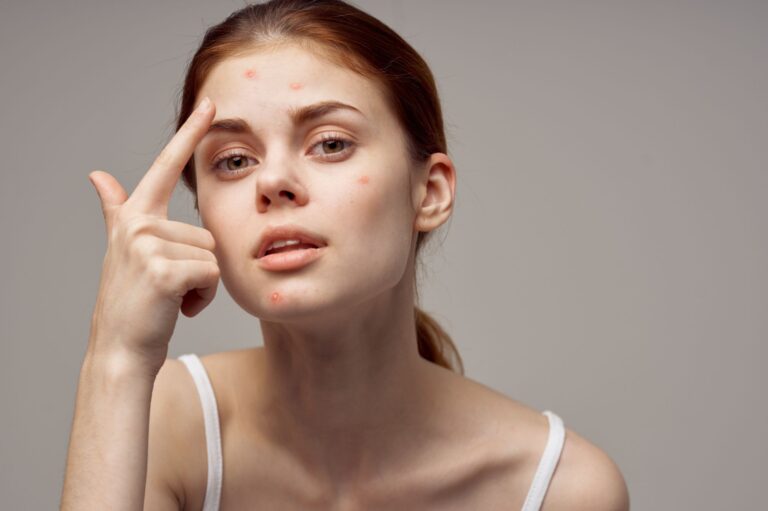June 24, 2024
Living with chronic acne can be challenging. At VIDA Dermatology, we understand how acne can affect self-confidence and well-being.
That’s why we’re here to offer support and guidance when it comes to managing chronic acne.
Let’s explore effective skincare routines, and treatment options, including professional acne treatments and lifestyle factors to help you address your chronic acne with confidence.
Skincare Routines for Managing Chronic Acne
Consistent skincare routines are vital for managing chronic acne.
They help regulate oil production, prevent clogged pores, and reduce inflammation over time, leading to clearer skin.
This simple skincare routine is an important step in the journey to managing chronic acne:
Cleansing
To effectively manage chronic acne, start with a gentle yet thorough cleansing routine.
Use a non-comedogenic cleanser suited to your skin type to remove excess oil, dirt, and bacteria without causing irritation.
Exfoliating
Exfoliation is an essential skin care step for removing dead skin cells that can clog pores and cause acne.
However, be careful not to over-exfoliate. Doing so can irritate your skin and lead to more breakouts. Choose a mild exfoliant and limit use to 2-3 times per week.
Moisturizing
Even acne-prone skin needs hydration. Choose oil-free, non-comedogenic moisturizers to keep the skin balanced and hydrated without adding extra oil that could clog pores.
Sun Protection
In order to manage chronic acne and prevent post-inflammatory hyperpigmentation, it’s important to protect your skin from the sun.
To shield your skin from UV rays, include a broad-spectrum sunscreen with an SPF of 30 or higher in your daily skincare routine.
Acne Products – Ingredients to Avoid
It’s important to read the ingredients in acne products to identify and avoid potential irritants, allergens, and comedogenic substances that can make your acne worse.
By looking carefully at product labels, you can choose skin care products that are compatible with your skin type and acne concerns. Here are some ingredients you should avoid:
Comedogenic Ingredients
Steer clear of products containing comedogenic ingredients that can clog pores and worsen acne. Common culprits include coconut oil, algae extract, and wheat germ oil.
Harsh Chemicals
Avoid acne products containing harsh chemicals like sulfates and parabens. These can strip the skin of its natural oils and disrupt its barrier function, leading to increased breakouts.
Fragrances and Irritants
Be wary of fragrances and other potential irritants in acne products, as they can cause inflammation and sensitivity in acne-prone skin. Choose fragrance-free and hypoallergenic options to minimize the risk of irritation and exacerbating acne.
The Best Way to Manage Chronic Acne
Apart from routines and products, managing chronic acne requires a holistic approach that addresses underlying factors contributing to the condition.
By looking at the big picture when it comes to chronic acne, you can make sustainable changes that will give you lasting results:
Consistency is Key – Stick to a Routine
Managing chronic acne is all about maintaining a consistent skincare routine. Stick to your skincare routine to allow the products to work effectively and minimize potential flare-ups.
Hydration and Nutrition
Proper hydration and nutrition can also help manage chronic acne. Drink water to keep your skin hydrated, and focus on a balanced diet rich in vegetables, fruits, and lean proteins.
Stress Management
Stress can make acne worse by triggering hormonal changes and increasing inflammation in the body. Stress-reducing activities like meditation, yoga, or deep breathing exercises can help keep stress levels in check and promote clearer skin.
Treatment Options for Chronic Acne
As part of this holistic approach to managing chronic acne, there are also different treatment options available.
While you can certainly try over-the-counter products, visiting a dermatologist generally yields more effective results.
Over-the-Counter Products
Over-the-counter acne treatments can be effective for managing mild to moderate acne.
Look for skincare products that contain ingredients like benzoyl peroxide, salicylic acid, or retinoids. These products work by unclogging pores, reducing inflammation, and preventing new breakouts.
Prescription Medications
For more severe cases of chronic acne, dermatologists may prescribe oral medications or topical treatments.
Oral antibiotics, hormonal therapies, and isotretinoin (Accutane) are commonly prescribed to target stubborn acne and prevent scarring.
Prescription-strength topical treatments, such as tretinoin and adapalene, can also help regulate skin cell turnover and reduce acne lesions.
It’s crucial to follow your dermatologist’s instructions carefully and attend follow-up appointments for monitoring and adjustments to your treatment plan.
Professional Treatments
In addition to topical and oral medications, various professional treatments are available to address chronic acne.
Chemical peels and laser therapy, for example, can help improve acne and acne scarring by exfoliating the skin. They help reduce inflammation and stimulate collagen production.
These treatments are typically performed in a dermatologist’s office or medical spa under the supervision of a trained professional.
Chronic Acne and Lifestyle
By addressing lifestyle factors alongside targeted skincare treatments, you can optimize your efforts to manage chronic acne and achieve clearer, healthier skin.
Diet and Acne
While the connection between diet and acne is complex and varies from person to person, some studies suggest that certain foods may affect acne.
For instance, high-glycemic foods, dairy products, and foods rich in saturated fats may exacerbate acne in some individuals.
Exercise and Acne
Regular exercise can have both positive and negative effects on acne. Exercise helps reduce stress levels, which can indirectly improve acne by minimizing stress-induced hormonal fluctuations.
However, sweat and friction from tight-fitting workout clothes can cause clogged pores and acne flare-ups.
Showering after exercise and wearing breathable, moisture-wicking fabrics can help mitigate these effects.
Sleep and Acne
Adequate and good-quality sleep is crucial for overall health and well-being, including skin health. While you sleep, your body repairs and regenerates skin cells, which can help improve acne and promote a clearer complexion.
Lack of sleep or poor sleep quality can disrupt hormone balance and increase inflammation, potentially worsening acne symptoms.
Acne Treatments in Edmonton for Healthy and Radiant Skin
Effectively managing chronic acne requires a comprehensive approach.
If you’re seeking guidance or personalized treatment for chronic acne, don’t hesitate to reach out to VIDA Dermatology.
Our experienced dermatologists are here to provide support and expertise on your journey to achieving acne-free skin.
Contact us today to schedule a consultation and take the first step towards renewed confidence and healthy skin!



